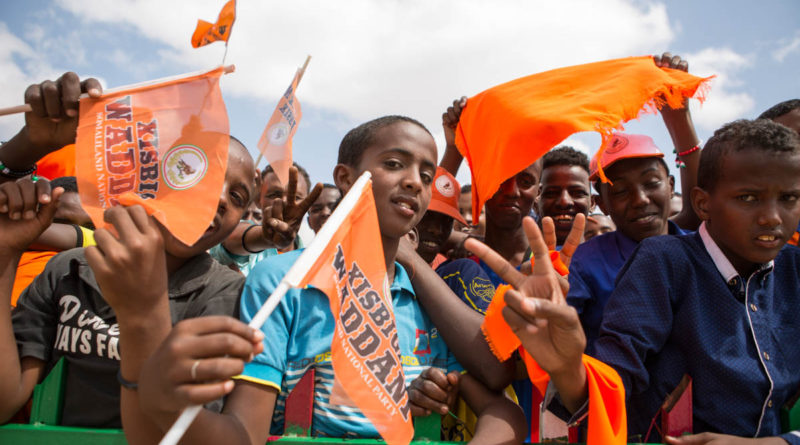Guban View: Pandering to clan identity undermines democracy
Lewis Center, Ohio–Somaliland has a serious clan identity crisis.It was revealed during the 2017 presidential election result; some of the electorate still believe that the election was rigged despite international observers declaring it to be free and fair.But the most serious challenge on Somaliland’s democracy is how the entrenched leadership of the three-party political system is pandering to clan identity to serve their parochial interest. If we do not address the clan identity problem, it could not only undermine our democracy but also destroy the fabric and cohesiveness of Somaliland society.
Clan or tribal identity politics is not unique to Somaliland, but it is a disease rife with corruption and cronyism, and it hampers on economic development. Clan identity based politics also impedes citizens’ opportunities to receive basic services such as water, electricity, education and health care, paved roads, jobs, especially marginalized communities.
Somaliland election campaigns are conducted not on platforms or ideas, but on political alliances along clan lines.Usually, the winners channel key government posts and resources to their supporters. Clans are not compatible with the ideas of common purpose and inclusiveness but thrive on zero sum gain. The prospects of jobs and other opportunities are scarce; as a result, competition for resources among clans, sometimes, turns into grievances or even deadly violence. Clan identity can also foster mistrust and suspicion among Somalilanders, and to view each other as rival clans instead of as fellow citizens..
The clan identity politics denies citizens the right to choose for their own representatives or the rights for equal representation on the legislature among all voters.
Up to now, the three-party political system have not yet agreed on when, how and the manner of 2019 legislative elections will be conducted. The two most contentious issues are: the makeup of the electoral commission and the allocation of seats to the competing clans. Some people are arguing the allocation of the seats should be based on equal number of voters for each constituency in the nation, while others who are supporting the status-quo are arguing to be based on clan identity or regions that were set up not by elected legislature but through executive decrees during Siad Barre military dictatorship —just to sow division among communities.
There are also large swaths of land in Guban area that its constituents were repeatedly denied to cast their votes because of pandering to clan identity.
It’s an unsustainable political system, and we should replace more united, inclusive Somaliland. However, it’s not going to be easy to replace the current entrenched system, and it would required a generational struggle, and sustained efforts from political, religious and business communities, to get it rid of it. But in the short term, we should at least mitigate the effect it should have on the economic development and the unity of our society.
On the political front, we should move away from political party system that depends on clan identity for getting to be elected. The current political system is based on clan for organization, fund raising and other functions of a party. The parties are not national or regional parties; each party belongs or dominated by a certain sub-clan who believe that they own the party.
Consequently, the process of nominating candidates for elected offices including the president is not democratic, open and transparent, and it is prone to manipulation and rigging.
Instead, the party should be based on platforms, ideas, or vision to tackle the pressing issues of the constituents and the challenges facing Somaliland. The process for the nomination of candidates should be free, and each legislative candidate should also know the constituency they represent.
But what Somaliland people need is more freedom and not less on the political space. What we have now is a rig system dominated by three-party monopoly system, which is not working for the electorate. All three political parties are united against the formation of more political parties that are based on political platforms and ideas and not on clan identity.
More importantly, to make Somaliland more representative and inclusive for all Somalilanders, we must revisit and open a dialogue on Somaliland constitution. It has been 18 years since the constitution was approved through referendum, but how many our elected leaders have read or follow the constitution?
A constitutional convention to review the Somaliland constitution is long overdue. The delegates that would review the constitution must represent people from different backgrounds of all spectrum of Somaliland society.
President Bihi has shown the determination to stand up to clan elders who have contributed so much of the clan identity politics that paralyzed Somaliland politics for the past two decades. He already cut off monthly hush money to some of the elders who are ‘exploiters and sowers of division’.
Mr. Bihi has also a chance to reform the country by supporting the constitutional convention because the future of the country depends on it.The current political system needs to evolve, the only remedy is a constitutional review convention to make Somaliland government— an effective inclusive constitutional democracy based on the rule of law and accountable to the people—not a state governed through executive fiat.
Ali-Guban Mohamed
Editor, Gubanmedia.com
Covering Horn of Africa Region

